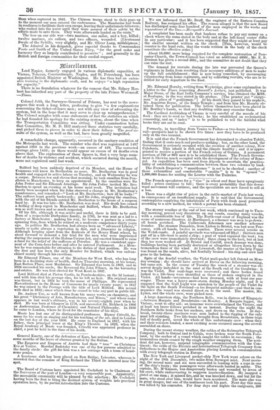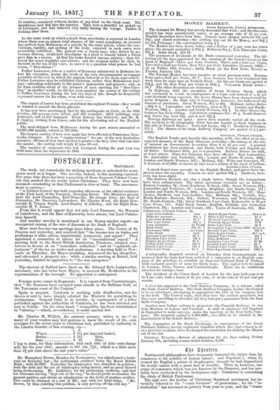The stormy weather at the end of last week, which
continued up to Tuesday morning, proved very disastrous on our coasts, causing many -wrecks, with a considerable loss of life. The North-east coast of England was the scene of numerous disasters. At Hartlepool, a schooner was seen to go down : all hands perished. The Cullercoats fishermen saw another schooner founder. The steamer Dunaskin, from Lisbon to Bristol, was lost near Penzance, with all hands, twelve in number. There were several wrecks on the Welsh coasts. A painful spectacle was witnessed off Rhyl : thirteen men put off in a life-boat to assist a ship; a gust of wind capsized the boat; ten of the crew were immediately drowned ; three clung to the keel, but at last they too were washed off. At Bristol and Cardiff, much damage was done, buildings having been partially destroyed or altogether blown down by the tremendous force of the wind. At Lowestoft, the master of the brig Peggy was found on the sands, alive, but fearfully bruised : his ship and crew had gone to the bottom.
Spite of the fearful weather, the Violet mail-packet left Ostend on Monday evening : she should have arrived at Dover on the following morning, but came not. In the course of Tuesday the wreck of a steamer was observed deeply imbedded in the sand at the South end of the Goodwins : it was the Violet. Her mail-bags were recovered ; and three bodies found lashed to a life-buoy were identified as those of' stokers employed in the Violet. All hands—seventeen—had been drowned, with at least one passenger. There was a heavy snow-storm during Monday night, and it is supposed that the Gull Light was mistaken by the people of the Violet for the light on the South Foreland—a too frequent mistake—and that in consequence the vessel was steered direct on to the sand. The master, Mr. Lynes, and the whole crew, were picked men.
A large American ship, the Northern Belle, was in distress off Kingsgate —between Margate and Broadstairs—on Monday. A Margate lugger, the Victory, went to offer aid ; an immense wave overwhelmed the Victory, and at least ten brave fellows perished in an instant. During the night the Northern Belle broke from her anchors, and drove on the rocks. At daybreak, twenty-three mariners were seen lashed to the rigging of the only mast left standing. Two life-boats brought from Broadatairs, in three trips full of deadly peril, saved the whole of this unfortunate crew : when they and their rescuers landed, a most exciting scene occurred among the crowds assembled on shore.
During the recent stormy weather, the cables of the Submarine Telegraph Company, both to Ostend and to Calais, were broken near the South Foreland, by the anchor of a vessel which caught the cables in succession ; the tremendous strain caused by the rough weather snapping them. The accident did not, however, suspend telegraphic communication with the Continent; the cable of the Electric and International Telegraph Company from Orfordness to the Hague and Amsterdam placing London in communication with every telegraph station in Europe.
The New York and Liverpool packet-ship New York went ashore on the night of the 19th December, two miles from Barnegat inlet. Next morning, the second mate and six men succeeded in landing with a rope in one of the ship's boats ; the passengers were afterwards landed in safety. The captain, Mr. AUKinnon, was dangerously beaten and wounded by seven of his crew, while endeavouring to suppress insubordination. He snapped a pistol at one man ; it missed fire, and he was knocked down, and but for the mate, who stood over him, would have been murdered. The mate also was in great danger, but one of the mutineers took his part. Next day this man was killed by his comrades. For four days and nights the emigrants, 300
in number, remained without shelter of any kind on the bleak coast. The murderous crew fled into the interior. They were a dreadful lot picked up at Liverpool, and had behaved very badly during the voyage. Justice is looking after them.





























 Previous page
Previous page